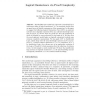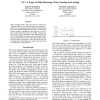171 search results - page 4 / 35 » Logical omniscience and common knowledge: WHAT do we know an... |
CSL
2006
Springer
13 years 11 months ago
2006
Springer
The Hintikka-style modal logic approach to knowledge has a well-known defect of logical omniscience, i.e., an unrealistic feature that an agent knows all logical consequences of he...
ENVSOFT
2006
13 years 7 months ago
2006
Floating point arithmetic is a subject all too often ignored, yet, for agent-based models in particular, it has the potential to create misleading results, and even to influence e...
BCSHCI
2008
13 years 9 months ago
2008
Many people do not read easily for all sorts of reasons: social and cultural, because of impairments, or because of their context. Even in the area of impairments, design for peop...
CORR
2007
Springer
13 years 7 months ago
2007
Springer
Common knowledge logic is meant to describe situations of the real world where a group of agents is involved. These agents share knowledge and make strong hypotheses on the knowled...
AAAI
2007
13 years 10 months ago
2007
When reasoning about actions and sensors in realistic domains, the ability to cope with uncertainty often plays an essential role. Among the approaches dealing with uncertainty, t...


